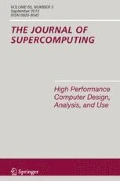Abstract
In this paper, we present an innovative method to solve the minimal keys problem strongly based on the Simplification Logic for Functional Dependencies. This novel method improves previous logic-based methods by reducing, in a significant degree, the size of the search space this problem deals with. Furthermore, the new method has been designed to easily fit within a parallel implementation, thereby increasing the boundaries current methods can reach.





Similar content being viewed by others
Notes
References
Benito-Picazo F, Cordero P, Enciso M, Mora A (2014) Increasing the efficiency of minimal key enumeration methods by means of parallelism. In: ICSOFT-EA 2014—proceedings of the 9th international conference on software engineering and applications, Vienna, Austria, 29–31 August 2014, pp 512–517
Codd EF (1970) A relational model of data for large shared data banks. Commun ACM 13(6):377–387
Cordero P, Enciso M, Mora A (2013) Automated reasoning to infer all minimal keys. In: Proceedings of the twenty-third international joint conference on artificial intelligence, IJCAI’13. AAAI Press, pp 817–823
Cordero P, Enciso M, Mora A, de Guzmán IP (2002) \(\text{ Sl }_{\text{ fd }}\) logic: elimination of data redundancy in knowledge representation. In: Advances in artificial intelligence 8th Ibero-American conference on AI, Seville, Spain, November 12–15, pp 141–150
Cordero P, Enciso M, Mora A, de Guzmán IP (2014) A tableaux-like method to infer all minimal keys. Log J IGPL 22(6):1019–1044
Ganter B, Wille R (1997) Formal concept analysis: mathematical foundations, 1st edn. Springer-Verlag New York Inc, Secaucus
Goh TN (2010) An information management paradigm for statistical experiments. Qual Reliab Eng Int 26(5):487–494
Krajca P, Outrata J, Vychodil V (2008) Parallel recursive algorithm for FCA. In: 6th International conference on concept lattices and their applications (CLA), vol 433. CEUR WS, Olomouc, pp 71–82 (2008)
Lèvy G, Baklouti F (2005) A distributed version version of the ganter algorithm for general galois lattices. In: 3rd International conference on concept lattices and their applications (CLA), vol 162. CEUR WS, Olomouc, pp 207–221
Lucchesi CL, Osborn SL (1978) Candidate keys for relations. J Comput Syst Sci 17(2):270–279
Maier D (1983) The theory of relational databases. Computer Science Press, Rockville
Mora A, Cordero P, Enciso M, Fortes I, Aguilera G (2012) Closure via functional dependence simplification. Int J Comput Math 89(4):510–526
Mora A, de Guzmán IP, Enciso M, Cordero P (2011) Ideal non-deterministic operators as a formal framework to reduce the key finding problem. Int J Comput Math 88(9):1860–1868
Pernelle N, Sas F, Symeonidou D (2013) An automatic key discovery approach for data linking. Web Semant Sci Serv Agents WWW 23:16–30
Saiedian H, Spencer T (1996) An efficient algorithm to compute the candidate keys of a relational database schema. Comput J 39(2):124–132
Sismanis Y, Brown P, Haas PJ, Reinwald B (2006) Gordian: efficient and scalable discovery of composite keys. In: Proceedings of the international conference on very large data bases, pp 691–702
Sridhar R, Iyengar SS (1990) Efficient parallel algorithms for functional dependency manipulations. In: Proceedings of the 2nd international symposium on databases in parallel and distributed systems, DPDS ’90, pp 126–137
Valtchev P, Duquenne V (2003) Towards scalable divide-and-conquer methods for computing concepts and implications. In: 4th International conference Journèes de l’Informatique Messine (JIM03): knowledge discovery and discrete mathematics, Metz (FR), pp 3–14
Valtchev P, Duquenne V (2008) On the merge of factor canonical bases. In: International conference on formal concept analysis (ICFCA). Lecture notes in computer science, vol 4933. Springer, Berlin, pp 182–198
Wastl R (1998) On the number of keys of a relational database schema. J Univers Comput Sci 4:547–559
Worland PB (2004) An efficient algorithm for 3nf determination. Inf Sci Inf Comput Sci 167(1–4):177–192
Yu CT, Johnson DT (1976) On the complexity of finding the set of candidate keys for a given set of functional dependencies. Inf Process Lett 5(4):100–101
Zobel J (1998) How reliable are the results of large-scale information retrieval experiments? In: Proceedings of the 21st annual international ACM SIGIR conference on research and development in information retrieval, SIGIR ’98, pp 307–314
Acknowledgments
Supported by Grants TIN2011-28084 and TIN2014-59471-P of the Science and Innovation Ministry of Spain, co-funded by the European Regional Development Fund (ERDF). The authors thankfully acknowledge the computer resources, technical expertise and assistance provided by the SCBI (Supercomputing and Bioinnovation) center of the University of Málaga (Andalucía Tech).
Author information
Authors and Affiliations
Corresponding author
Rights and permissions
About this article
Cite this article
Benito-Picazo, F., Cordero, P., Enciso, M. et al. Reducing the search space by closure and simplification paradigms. J Supercomput 73, 75–87 (2017). https://doi.org/10.1007/s11227-016-1622-1
Published:
Issue Date:
DOI: https://doi.org/10.1007/s11227-016-1622-1




